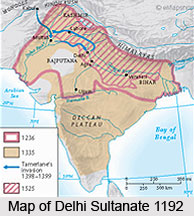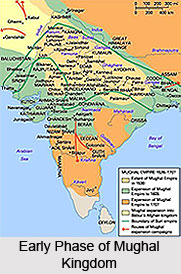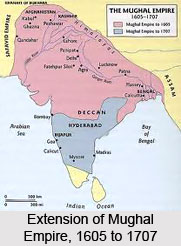 Indian administrative system in Muslim period brought about a change in the indigenous system of administration. The Muslim rule in India was established and consolidated by the Delhi Sultanate. The Sultanate was essentially a theocracy in which the Sultan was endowed with both the powers i.e. religious and temporal. He was the supreme executive, legislative and judicial authority. Besides he was the chief commander of the army and appointed the military generals as well as the high officers of the civil departments. He was a despot, exercising all kinds of powers. Their avowed object was to rule the country as per the tenets of the Holy Quran and to propagate Islam.
Indian administrative system in Muslim period brought about a change in the indigenous system of administration. The Muslim rule in India was established and consolidated by the Delhi Sultanate. The Sultanate was essentially a theocracy in which the Sultan was endowed with both the powers i.e. religious and temporal. He was the supreme executive, legislative and judicial authority. Besides he was the chief commander of the army and appointed the military generals as well as the high officers of the civil departments. He was a despot, exercising all kinds of powers. Their avowed object was to rule the country as per the tenets of the Holy Quran and to propagate Islam.
Ministers in Muslim Administration
The Sultan was assisted by a council of six ministers in the day to day administration of the country. They were his subordinates who could be appointed and dismissed at his will. Some Sultans used to appoint Naib-ul-Mulk who acted as the deputy of the Sultan for all purposes. He was in charge of the military organisation. The following were the Ministers: Wazir, Diwan-i-Rasalat, Diwan-i-Insha, Diwan-i-Ariz, Sadr-us-Sadur and Diwan-i-Qaza.
Revenue under Muslim Administration
 The Sultan had five main sources of revenue. They were as follows: Zakat, Jizya, Kharaj, Ushr, Khams.
The Sultan had five main sources of revenue. They were as follows: Zakat, Jizya, Kharaj, Ushr, Khams.
Army Administration under Muslim Rule
A huge army was maintained by the Sultanate. It consisted of four varieties of soldiers: permanent, soldiers recruited by the Sultan; soldiers offered by the Provincial Governors and nobles; soldiers recruited during the times of war; Muslim volunteers enlisted for fighting Jihad or Holy war. The army was composed of cavalry, infantry and elephants. Among these, the cavalry formed the backbone of the army. Army was under the control of Diwan-i-Ariz.
Judiciary System under Muslim Rule
The Sultan was the fountain head of justice of the land. A separate department known as Diwan-i-Qaza was functioning to dispense justice. Sultan was the highest court of appeal. Capital punishments were meted out only after obtaining the sovereign`s consent. The Sultan held his court twice a week and dispensed justice as per the advices given by the Chief Qazi in the temporal affairs and by the Sadr-us-Sudur on religious affairs. Chief Qazi was the highest judicial officer. The cases were decided in accordance with the Islamic law. Qazis were appointed in provinces, districts and towns for rendering justice to the people. City Magistrates were appointed for apprehending the criminals and trying the cases. Kotwals were also appointed for city administration. The Criminal Code was very severe.
Provincial Administration under Muslim Rule
 The empire was divided into three varieties of provinces. The first category consisted of the Iqtar which were under the command of Muqti. The second category was composed of newly conquered provinces under military Governors known as Walis. The last variety comprised of the suppressed and subdued Hindu kingdoms. The Delhi Sultanate had 23 provinces during the apex of its glory under Muhammad bin Tughlaq. The provincial administration was similar to that of the Central Government. The provinces were divided into Shiqs and each Shiq was placed under the control of Shiqdar. The next unit was Pargana which was under the control of Amil. The last unit was the village and it was administered by a Panchayat. Chowkidar and Patwari were the officers working in villages.
The empire was divided into three varieties of provinces. The first category consisted of the Iqtar which were under the command of Muqti. The second category was composed of newly conquered provinces under military Governors known as Walis. The last variety comprised of the suppressed and subdued Hindu kingdoms. The Delhi Sultanate had 23 provinces during the apex of its glory under Muhammad bin Tughlaq. The provincial administration was similar to that of the Central Government. The provinces were divided into Shiqs and each Shiq was placed under the control of Shiqdar. The next unit was Pargana which was under the control of Amil. The last unit was the village and it was administered by a Panchayat. Chowkidar and Patwari were the officers working in villages.
The Mughal rule followed along the same lines. The king was the head of the Mughal Empire and its administration. The rulers had firm faith in the doctrine of Divine Rights. The Mughal rulers lived in luxury and their style was magnificent and prosperous. During this period the nobility played a significant role in their administration. The Council of Ministers was like that of Sultanate period as was the system of provincial administration. Impartial judiciary was proscribed during this period.




















